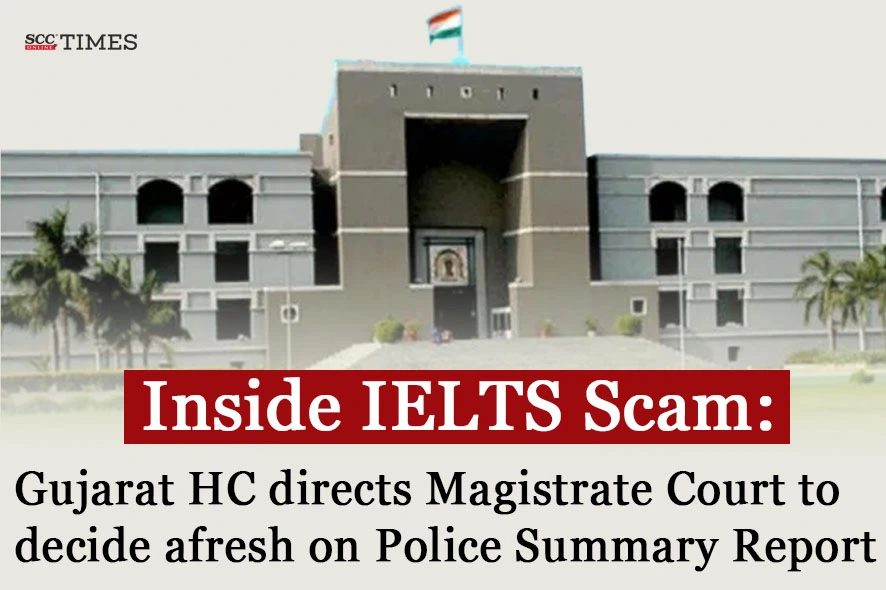Gujarat High Court: In a revision application filed against the order of the Sessions Court, which had set aside the decision of the Chief Judicial Magistrate allowing the summary report submitted by the Deputy Superintendent of Police regarding alleged illegal qualifications obtained in the International English Language Testing System (I.E.L.T.S.) examination, the Single Judge Bench of L.S. Pirzada, J., partly allowed the present revision application.
The Court confirmed the order passed by the Additional Sessions Judge, whereby the summary report order was set aside, and the matter was remitted to the Court of the Judicial Magistrate, Mehsana, for a fresh decision. However, the Court quashed and set aside the direction issued by the Sessions Court to the Chief Judicial Magistrate to forward the case to the Director General of Police for appointing an “honest and competent” police officer of the rank of P.I. or Dy.S.P. for further investigation. The Court held that no court has the authority to issue such a direction and further instructed the Chief Judicial Magistrate to decide the summary report afresh, uninfluenced by the previous observations.
Background
In the instant case four accused had been found to have illegally entered the United States of America. Upon investigation by U.S. authorities, it was found that the four persons had illegally qualified the I.E.L.T.S. exam as they had secured 8 bands in the exam but could not speak, write or understand English at all. The U.S. Consulate General had sent an email regarding the same to the Commissioner of Police, Mumbai who in turn had sent an email to the Superintendent of Police, Mehsana, on the basis of which a preliminary inquiry was conducted.
The preliminary inquiry revealed that the four persons had committed irregularity in obtaining high score certificate in the I.E.L.T.S. exam and on the basis of this report, an FIR was filed for offences under Sections 406, 420, 465, 467, 468, 471 and 120B of the Penal Code, 1860 (‘IPC’). The investigation was subsequently transferred to Deputy S.P. , who, after investigating the case for almost two and a half months, submitted a ‘B’ Summary report with the Chief Judicial Magistrate, Mehsana ( ‘CJM’), stating that there was insufficient evidence against the accused.
The CJM allowed the ‘B’ Summary report,and the State preferred an appeal before the Sessions Court, Mehsana. The Additional Sessions Judge set aside the said order, remitted the case to the CJM for passing an appropriate order and directed the CJM to send the case to Director General of Police, Gujarat for appointing an honest and competent officer to the rank of P.I. or Deputy S.P. for conducting further investigation. The order of the Sessions Court was challenged in the instant revision application.
Analysis, Law and Decision
The Court noted that according to the ‘B’ summary report submitted by Deputy S.P. , the offence had been committed in Navasari and therefore Mehsana police had no jurisdiction to investigate the case. However, according to the investigation by P. I. , the accused had applied for visa and filled up the I.E.L.T.S. exam form in Mehsana and therefore Mehsana courts would have jurisdiction. Furthermore, the Court noted that the ‘B’ Summary report was submitted by the Deputy S.P. without report of the handwriting expert, which revealed that the handwriting in the exam papers did not match the handwriting of the four accused persons, implying that the answer-sheets had not been written by the four accused persons.
The Court therefore opined that the Deputy S.P. had not completed the investigation properly and even without waiting for the opinion of the handwriting expert, he had jumped to the conclusion that no sufficient evidence had been found and that the offence had been committed in Navsari and not Mehsana.
The Court held that the Sessions Court had rightly rejected the order passed by the CJM and remitted the case to decide afresh on the summary report submitted by the Deputy S.P.
However, with regards to the direction for appointment of an honest and competent police officer to the rank of P.I. or Deputy S.P. for further investigation, the Court held that a court cannot direct any judicial officer to pass such an order. The order was held incorrect in the eye of the law stating that it was always the domain of the Magistrate to pass such an order.
[Amitkumar Surendrabhai Chaudhary v. State of Gujarat, 2025 SCC OnLine Guj 2853, decided on 11-7-2025]
Advocates who appeared in this case:
For the Applicant: I.H. Syed ,Senior Advocate, Amaan Syed, Advocate
For the Respondent: Jyoti Bhatt ,APP



